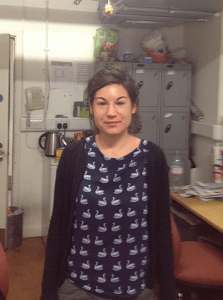PhD Archaeology Student/Tutor at The Brilliant Club: Inspire Me
By UCL Careers, on 7 July 2015
As part of our #UCLInspireMe series, Vana Orfanou, Brilliant Club tutor and PhD student in Archaeology, talks to us about how she got this role and shares some tips for UCL students who want to get into the academic sector. 
How did you get into your role?
I am a PhD Archaeology student at my writing up stage and I also work as a Tutor in collaboration with The Brilliant Club. I first found out about this charity organisation through an email circulated by UCL calling PhD students to participate in a teaching programme focussing on non-selective state London schools and, then on, by visiting The Brilliant Club’s very well organised website.
The idea of conducting university-style tutorials to underprivileged pupils, and promoting their research and essay writing skills which would in turn raise their aspirations and increase their chances of getting accepted in one of the top UK universities seemed quite appealing from the beginning. What is more, teaching with The Brilliant Club provided me with the exciting opportunity of designing and delivering a course on a topic immediately relevant to my research focus.
What are the best things about working in your role?
The best thing about working with the Brilliant Club is the interaction with the pupils itself. Only too often I am struck by students’ perceptions and interpretations, while interaction with each group of pupils is a unique experience. The high-standard content taught also provides a challenging ground for some amazing discussions to take place. Watching the students producing their own, well-structured and justified arguments is probably one of the most rewarding moments. As I said to my students in my last placement, ‘my Brilliant Club day was the best of my week’.
What are the biggest challenges you face in your work?
Amongst the biggest challenges of being a Brilliant Club Tutor is communicating to pupils complex ideas by making them approachable at the same time. Keeping expectations high could prove a challenge as usually students have already enough on their plate.
What top tips would you pass on to a student interested in this type of work?
In becoming a Brilliant Club Tutor it is important that emphasis is put on teaching and creating knowledge rather than on merely presenting it. Excellent organisation and communication skills, and a drive to create opportunities for school students will definitely help!
To talk to a Careers Consultant for further information on applying for a PhD, visit: www.ucl.ac.uk/careers
 Close
Close


